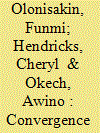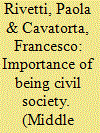| Srl | Item |
| 1 |
ID:
142053


|
|
|
|
|
| Summary/Abstract |
This article explores the convergence between three pillars of influence – feminist security studies, civil society activism and policy decision-making – and its role in the adoption and implementation of United Nations Security Council Resolution (UNSCR) 1325. It argues that these three pillars, individually and collectively, have made important contributions to the debate and action on the gender and security agenda, but that they remain organically disconnected. Their convergence has the potential to achieve path-breaking results in the sphere of gender and security, whilst their divergence makes transformation unattainable. We show the disconnect in the application of UNSCR 1325 in Africa and argue that this is partly the reason why, despite enormous efforts, the gains realised in terms of gender equality in the peace and security arena have been negligible.
|
|
|
|
|
|
|
|
|
|
|
|
|
|
|
|
| 2 |
ID:
122053


|
|
|
|
|
| Publication |
2013.
|
| Summary/Abstract |
Through a non-conventional understanding of civil society activism, the article provides an explanation of the relationship between the student movement and Khatami's governments in Iran. This study approaches 'civil society' as a space where we may observe the dynamics and exercise of power. The case study of the interactions between the Daftar-e Tahkim-e Vahdat and Khatami's governments illustrates how civil society is not a fixed concept, but a contested one. By analysing the conflicts and interactions between these two actors, the article examines the continuous negotiations that reinvent the meaning of civil society and produce political inclusion or exclusion.
|
|
|
|
|
|
|
|
|
|
|
|
|
|
|
|
| 3 |
ID:
190424


|
|
|
|
|
| Summary/Abstract |
This paper examines the limits of Indonesian civil society activism in advancing democratic politics. This activism, mainly by middle-class reformers, has not only failed to prevent democracy from being hijacked by illiberal interests but also contributed to justifying the deepening of political illiberalism. A predominantly anti-political approach among civil society activists mainly aims to establish new institutions and policy designs to generate reforms, while allowing entrenched power relations to remain unchallenged and to pervade new institutions. Meanwhile, social protests mobilized by this kind of activism, both on the streets and social media platforms, also tend to be sporadic and have no clear leadership and structure, while protest demands are often contradictory, making these too weak to challenge anti-democratic interests. This paper challenges existing studies that extoll Indonesian civil society activists for their success in advocating certain legislation, policies, and institutions. The weakening of the Indonesian Corruption Eradication Commission (Komisi Pemberantasan Korupsi, KPK) illustrates how even trusted democratic institutions equipped with extraordinary powers and capacities are vulnerable to vested interests. Not only have Indonesian civil society activists failed to defend the KPK, but many of them have justified attempts to paralyze this agency.
|
|
|
|
|
|
|
|
|
|
|
|
|
|
|
|